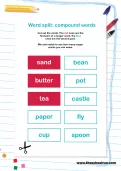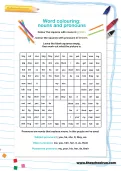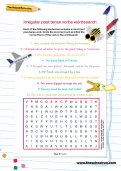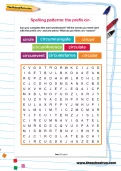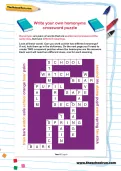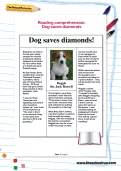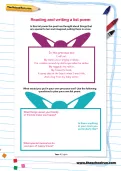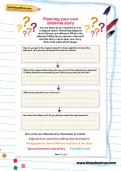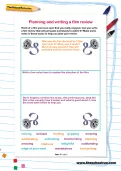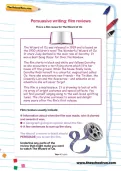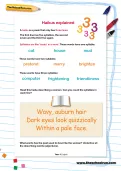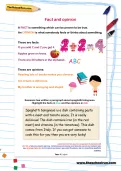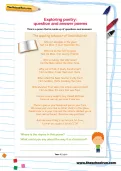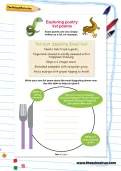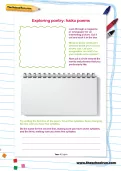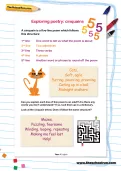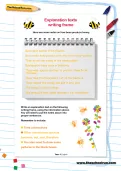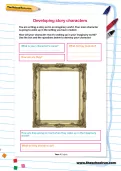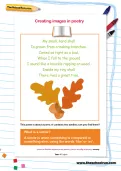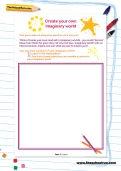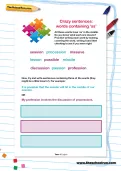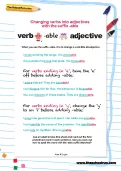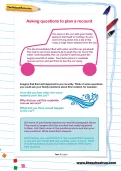Read this newspaper report about a clever puppy who stops a robbery then answer the questions: Where is the headline? Why is it in bold? Why do we use pictures in newspaper articles? What are the words under the picture called? Underline all the words and phrases related to time. How many paragraphs are there in the text?
or
Register to add to your saved resources
Already a subscriber? to view this content.
In this list poem the poet has thought about things that are special to her and imagined putting them in a box. What would you put in your own precious box? Use the following questions to plan your own list poem.
or
Register to add to your saved resources
You are taken by an invisible force to a magical island. Something happens and it throws up a dilemma. What is the dilemma? What do you decide in the end? Use this story map to plan your story then write up your dilemma story.
or
Register to add to your saved resources
Already a subscriber? to view this content.
Think of a film you have seen that you really enjoyed. Can you write a film review that will persuade somebody to watch it? Make some notes in these boxes to help you plan your review.
or
Register to add to your saved resources
Already a subscriber? to view this content.
Film reviews usually include: information about when the film was made, who it starred and awards it won; a few sentences to sum up the story of the film; a paragraph giving an opinion about the film.
The idea of this review is that it should PERSUADE you to watch the film. Read this film review for The Wizard of Oz and underline any parts of the review that might make you want to watch The Wizard of Oz.
or
Register to add to your saved resources
Already a subscriber? to view this content.
You’re writing a story about a character exploring an imaginary world. What do they experience in your magical land? Try to include as many powerful verbs as you can. Use the box below to help you!
or
Register to add to your saved resources
Already a subscriber? to view this content.
A haiku is a poem that only has three lines. The first line has five syllables, the second seven and the third five again. Read this haiku describing a woman. Can you count the syllables in each line? What words has the poet used to describe the woman? Underline all the describing words (adjectives).
or
Register to add to your saved resources
Already a subscriber? to view this content.
A FACT is something which can be proven to be true. An OPINION is what somebody feels or thinks about something. Someone has written a paragraph about spaghetti bolognese. Highlight the facts in blue and the opinions in red.
or
Register to add to your saved resources
Already a subscriber? to view this content.
Read this article about a very clever dog. Can you find three facts in the newspaper article and underline them in blue? Can you find three opinions in the article? Underline them in red.
or
Register to add to your saved resources
Already a subscriber? to view this content.
Here is a poem that is made up of questions and answers. Where is the rhyme in this poem? What could you say about the way it is structured?
or
Register to add to your saved resources
Already a subscriber? to view this content.
Some poems are very simply written as a list. Write your own list poem about the most disgusting dinner ever.
or
Register to add to your saved resources
Already a subscriber? to view this content.
Look through a magazine or newspaper for an interesting picture. Cut it out and stick it in the box. Write as many words and phrases about your picture as you can. Let your imagination run wild! Can
you include some similes? Now put a circle around the words and phrases that you particularly like. Can you write a haiku using these words?
or
Register to add to your saved resources
Already a subscriber? to view this content.
A cinquain is a five-line poem which follows a particular structure. Can you explain each line of this poem to an adult? Are there any words you don’t understand? If so, look them up in a dictionary. Look at the cinquain below. Does it follow the same structure?
or
Register to add to your saved resources
Already a subscriber? to view this content.
Read these notes on how bees produce honey. Write an explanation text on the writing frame, using the information above. You will need to put the notes above into proper sentences. Remember to include: time connectives; other connectives such as because, but, and, therefore; you also need to draw some pictures in the blank boxes.
or
Register to add to your saved resources
You are writing a story set in an imaginary world. Your main character is going to wake up in the setting you have created. How will your character react to waking up in your imaginary world? Use the box and the questions below to develop your character.
or
Register to add to your saved resources
Already a subscriber? to view this content.
A simile is when something is compared to something else, using the words ‘like’ or ‘as’. This poem is about acorns. It contains two similes; can you find them?
or
Register to add to your saved resources
Already a subscriber? to view this content.
Can you create an imaginary world to set a story in? Think of books you have read set in imaginary worlds – you could ‘borrow’ ideas from these for your story. Or why not type ‘imaginary world’ into an internet search engine and use what you see to inspire you? Can you draw a picture of your imaginary world? Don't forget to label it with explanations and use lots of good adjectives and similes to describe your imaginary world.
or
Register to add to your saved resources
Already a subscriber? to view this content.
All these words have ‘ss’ in the middle. Do you know what each one means? Practise writing each word by looking, covering the word, writing it and then checking to see if you were right.
or
Register to add to your saved resources
Already a subscriber? to view this content.
When you use the suffix -able, it is to change a verb into an adjective. For verbs ending in ‘e’, take the ‘e’ off before adding -able. For verbs ending in ‘y’, change the ‘y’ to an ‘i’ before adding -able. Can you spell these words with the -able suffix attached?
or
Register to add to your saved resources
Already a subscriber? to view this content.
Read about this incident on a family holiday and imagine that this had happened to you recently. Think of some questions you could ask your family members about this incident. Get some of your family members to read the paragraph above, ask them your questions and write a recount of the event.
or
Register to add to your saved resources
Already a subscriber? to view this content.
